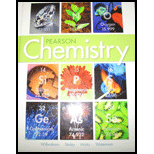
Chemistry 2012 Student Edition (hard Cover) Grade 11
12th Edition
ISBN: 9780132525763
Author: Prentice Hall
Publisher: Prentice Hall
expand_more
expand_more
format_list_bulleted
Question
Chapter 21, Problem 52A
Interpretation Introduction
Interpretation: Some applications of
Concept Introduction: An electrolytic cell is used to convert electrical energy to chemical energy. Here, an electrolytic cell uses electrical energy to make a non-spontaneous
Expert Solution & Answer
Explanation of Solution
Some applications of electrolysis in the field of metallurgy are as follows:
- Electroplating and electroforming: In an electroplating process, the deposition of a thin layer of metal is made in an object in an electrolytic cell. It is done to protect the surface of the object from corrosion. Here, an object that undergoes electroplating is made the cathode (where reduction takes place) and the metal which is electroplated on the surface of the object is taken as the anode (where oxidation takes place). When direct current is applied, metal ions move from the anode to the object to be plated. Now, in an electroforming process, an object is reproduced by taking metal from the cathode of a cell. The object is then electroplated with a coating of metal. This is then stripped off of the mold.
- Electrowinning and electrorefining: In the electrowinning process, the purification of impure metals can be done in electrolytic cells. Here, the reduction of cations of molten salts takes place at the cathode to give pure metals. This process can be used to extract aluminum from its ore. In the electrorefining process, impure metal made the anode where oxidation occurs. Its oxidation results in the formation of cations, which are then reduced to pure metals at the cathode. It is used to prepare ultrapure silver, copper, and lead metals.
Chapter 21 Solutions
Chemistry 2012 Student Edition (hard Cover) Grade 11
Ch. 21.1 - Prob. 1LCCh. 21.1 - Prob. 2LCCh. 21.1 - Prob. 3LCCh. 21.1 - Prob. 4LCCh. 21.1 - Prob. 5LCCh. 21.1 - Prob. 6LCCh. 21.1 - Prob. 7LCCh. 21.2 - Prob. 8SPCh. 21.2 - Prob. 9SPCh. 21.2 - Prob. 10SP
Ch. 21.2 - Prob. 11SPCh. 21.2 - Prob. 12SPCh. 21.2 - Prob. 13SPCh. 21.2 - Prob. 14LCCh. 21.2 - Prob. 15LCCh. 21.2 - Prob. 16LCCh. 21.2 - Prob. 17LCCh. 21.2 - Prob. 18LCCh. 21.2 - Prob. 19LCCh. 21.3 - Prob. 20LCCh. 21.3 - Prob. 21LCCh. 21.3 - Prob. 22LCCh. 21.3 - Prob. 23LCCh. 21.3 - Prob. 24LCCh. 21.3 - Prob. 25LCCh. 21 - Prob. 26ACh. 21 - Prob. 27ACh. 21 - Prob. 28ACh. 21 - Prob. 29ACh. 21 - Prob. 30ACh. 21 - Prob. 31ACh. 21 - Prob. 32ACh. 21 - Prob. 33ACh. 21 - Prob. 34ACh. 21 - Prob. 35ACh. 21 - Prob. 36ACh. 21 - Prob. 37ACh. 21 - Prob. 38ACh. 21 - Prob. 39ACh. 21 - Prob. 40ACh. 21 - Prob. 41ACh. 21 - Prob. 42ACh. 21 - Prob. 43ACh. 21 - Prob. 44ACh. 21 - Prob. 45ACh. 21 - Prob. 46ACh. 21 - Prob. 47ACh. 21 - Prob. 48ACh. 21 - Prob. 49ACh. 21 - Prob. 50ACh. 21 - Prob. 51ACh. 21 - Prob. 52ACh. 21 - Prob. 53ACh. 21 - Prob. 54ACh. 21 - Prob. 55ACh. 21 - Prob. 56ACh. 21 - Prob. 57ACh. 21 - Prob. 58ACh. 21 - Prob. 59ACh. 21 - Prob. 60ACh. 21 - Prob. 61ACh. 21 - Prob. 62ACh. 21 - Prob. 63ACh. 21 - Prob. 64ACh. 21 - Prob. 65ACh. 21 - Prob. 66ACh. 21 - Prob. 67ACh. 21 - Prob. 68ACh. 21 - Prob. 69ACh. 21 - Prob. 70ACh. 21 - Prob. 71ACh. 21 - Prob. 72ACh. 21 - Prob. 73ACh. 21 - Prob. 74ACh. 21 - Prob. 75ACh. 21 - Prob. 76ACh. 21 - Prob. 77ACh. 21 - Prob. 78ACh. 21 - Prob. 79ACh. 21 - Prob. 80ACh. 21 - Prob. 81ACh. 21 - Prob. 82ACh. 21 - Prob. 83ACh. 21 - Prob. 84ACh. 21 - Prob. 85ACh. 21 - Prob. 86ACh. 21 - Prob. 87ACh. 21 - Prob. 88ACh. 21 - Prob. 89ACh. 21 - Prob. 90ACh. 21 - Prob. 91ACh. 21 - Prob. 92ACh. 21 - Prob. 93ACh. 21 - Prob. 94ACh. 21 - Prob. 95ACh. 21 - Prob. 96ACh. 21 - Prob. 97ACh. 21 - Prob. 98ACh. 21 - Prob. 99ACh. 21 - Prob. 100ACh. 21 - Prob. 101ACh. 21 - Prob. 102ACh. 21 - Prob. 103ACh. 21 - Prob. 104ACh. 21 - Prob. 105ACh. 21 - Prob. 106ACh. 21 - Prob. 1STPCh. 21 - Prob. 2STPCh. 21 - Prob. 3STPCh. 21 - Prob. 4STPCh. 21 - Prob. 5STPCh. 21 - Prob. 6STPCh. 21 - Prob. 7STPCh. 21 - Prob. 8STPCh. 21 - Prob. 9STPCh. 21 - Prob. 10STPCh. 21 - Prob. 11STPCh. 21 - Prob. 12STPCh. 21 - Prob. 13STP
Knowledge Booster
Recommended textbooks for you
 ChemistryChemistryISBN:9781305957404Author:Steven S. Zumdahl, Susan A. Zumdahl, Donald J. DeCostePublisher:Cengage Learning
ChemistryChemistryISBN:9781305957404Author:Steven S. Zumdahl, Susan A. Zumdahl, Donald J. DeCostePublisher:Cengage Learning ChemistryChemistryISBN:9781259911156Author:Raymond Chang Dr., Jason Overby ProfessorPublisher:McGraw-Hill Education
ChemistryChemistryISBN:9781259911156Author:Raymond Chang Dr., Jason Overby ProfessorPublisher:McGraw-Hill Education Principles of Instrumental AnalysisChemistryISBN:9781305577213Author:Douglas A. Skoog, F. James Holler, Stanley R. CrouchPublisher:Cengage Learning
Principles of Instrumental AnalysisChemistryISBN:9781305577213Author:Douglas A. Skoog, F. James Holler, Stanley R. CrouchPublisher:Cengage Learning Organic ChemistryChemistryISBN:9780078021558Author:Janice Gorzynski Smith Dr.Publisher:McGraw-Hill Education
Organic ChemistryChemistryISBN:9780078021558Author:Janice Gorzynski Smith Dr.Publisher:McGraw-Hill Education Chemistry: Principles and ReactionsChemistryISBN:9781305079373Author:William L. Masterton, Cecile N. HurleyPublisher:Cengage Learning
Chemistry: Principles and ReactionsChemistryISBN:9781305079373Author:William L. Masterton, Cecile N. HurleyPublisher:Cengage Learning Elementary Principles of Chemical Processes, Bind...ChemistryISBN:9781118431221Author:Richard M. Felder, Ronald W. Rousseau, Lisa G. BullardPublisher:WILEY
Elementary Principles of Chemical Processes, Bind...ChemistryISBN:9781118431221Author:Richard M. Felder, Ronald W. Rousseau, Lisa G. BullardPublisher:WILEY

Chemistry
Chemistry
ISBN:9781305957404
Author:Steven S. Zumdahl, Susan A. Zumdahl, Donald J. DeCoste
Publisher:Cengage Learning

Chemistry
Chemistry
ISBN:9781259911156
Author:Raymond Chang Dr., Jason Overby Professor
Publisher:McGraw-Hill Education

Principles of Instrumental Analysis
Chemistry
ISBN:9781305577213
Author:Douglas A. Skoog, F. James Holler, Stanley R. Crouch
Publisher:Cengage Learning

Organic Chemistry
Chemistry
ISBN:9780078021558
Author:Janice Gorzynski Smith Dr.
Publisher:McGraw-Hill Education

Chemistry: Principles and Reactions
Chemistry
ISBN:9781305079373
Author:William L. Masterton, Cecile N. Hurley
Publisher:Cengage Learning

Elementary Principles of Chemical Processes, Bind...
Chemistry
ISBN:9781118431221
Author:Richard M. Felder, Ronald W. Rousseau, Lisa G. Bullard
Publisher:WILEY